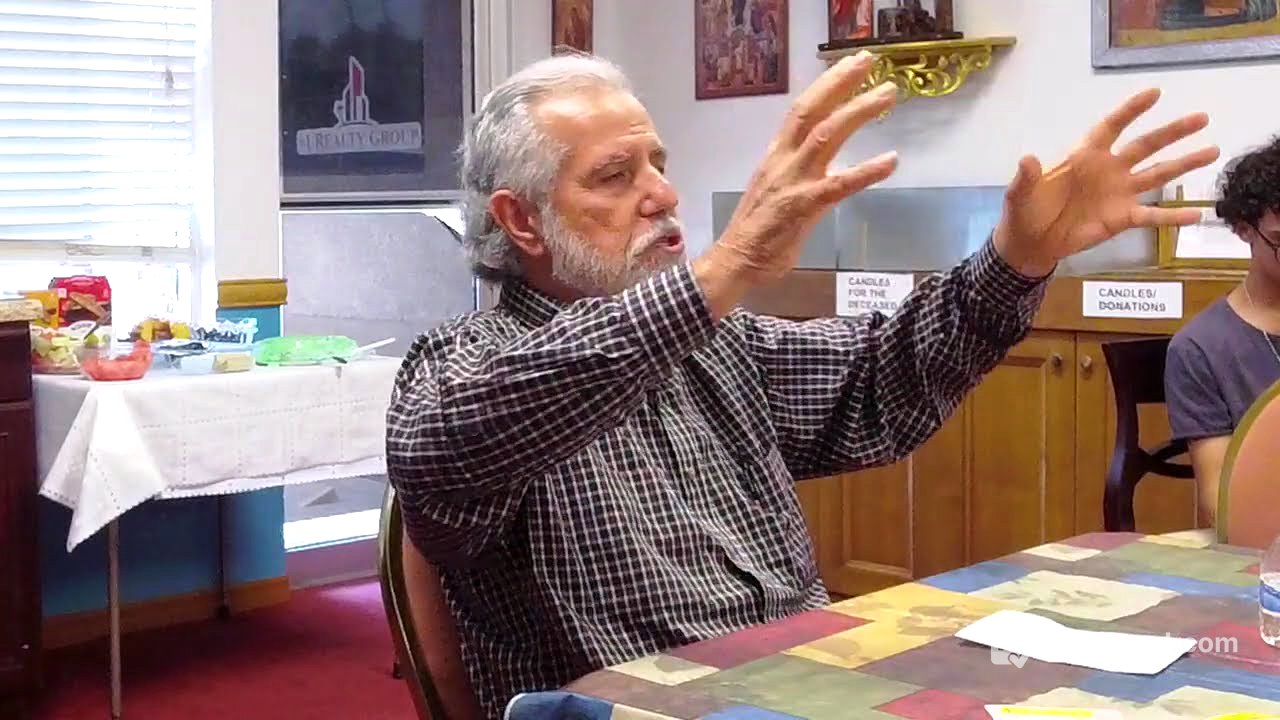TLDR;
The speaker discusses the essence of the Christian Orthodox faith, emphasizing union with Christ through the mysteries of the church, particularly Holy Communion. He explains that God created humans out of love, endowing them with His image and the potential for immortality and wisdom. The fall of mankind shattered this image, leading to distorted desires and passions. The Incarnation of Christ and baptism are essential for regenerating this image, forgiving sins, and adopting believers as children of God.
- The core of Orthodox Christianity is uniting with Christ through Holy Communion.
- Humans were created out of God's love and given His image, which was later shattered by the fall.
- Regeneration of the divine image happens through Incarnation of Christ and baptism.
- Salvation is a synergy between God and man, requiring free will and surrender to God.
- Humility, obedience, and repentance are vital virtues for spiritual growth.
Introduction and Blessings [0:00]
The speaker begins by expressing gratitude for the invitation to speak and acknowledges the blessings of the holy fathers and friends present. He shares a personal connection to St. Catherine, the namesake of the church, and recounts his recent pilgrimage to the Monastery of St. Catherine, highlighting the experience of attending a liturgy at the top of the mountain.
The Essence of Orthodox Faith: Union with Christ [2:46]
The speaker emphasizes that the most important aspect of the Orthodox faith is uniting with Christ through the mysteries of the church. Lectures and scriptures are helpful, but the ultimate goal is to become one body and one blood with Christ. This union is unique to Christianity, where believers not only believe in God but also love and commune with Him. The medicine of immortality is Holy Communion, which is essential for eternal life.
God's Love and Creation of Humanity [5:01]
God created humans out of love, wanting to share His love and expand it beyond the Holy Trinity. He created humans in His image, giving them everything He has, including the potential for immortality and wisdom through grace. Saints are those who humble themselves and allow God to work within them, surrendering their will to His.
The Shattered Image and the Fall [7:33]
The image of God in humans was shattered after the fall, distorting their minds and energies. The perfect love of God became self-centered love, and the powers of the soul were misdirected, leading to passions. Instead of being masters of the universe, humans became egotistical, seeking to control and exploit the environment for their own pleasure.
The Incarnation and Regeneration [10:15]
The shattered image of God could only be fixed through the Incarnation of Christ. Those who accept Christ are given the power to become children of God. The Incarnation provides the potential to progress from the image of God to His likeness, which was unattainable through human efforts alone. Holy baptism is the labor of regeneration, refashioning individuals through water.
The Significance of Water and Baptism [12:09]
The theme of water in the gospels signifies baptism, which is essential for entering the body of Christ. Through baptism, sins are forgiven, and individuals are adopted as sons and daughters of Christ. Additionally, believers are invited to share in the sufferings of Christ, facing persecution for their faith.
Synergy and Free Will in Salvation [16:54]
Orthodoxy emphasizes synergy between God and man in salvation, requiring free will and surrender to God. God does 99% of the work, but individuals must offer their will. St. Augustine said that God cannot save someone without their will. Believers must deny their bad self, including egotism and sinful desires, to connect with Christ.
Keeping the Flame Alive After Baptism [20:52]
After baptism, it is crucial to keep the flame of the Holy Spirit active by adding oil, symbolizing continuous effort and vigilance. Neglecting this can lead to the inactivation of the Spirit, making one no different from a heathen. Persecution may arise, even within one's own home, but love for Christ must surpass all earthly attachments.
Love for Christ and Overcoming Fear of Death [23:31]
Nothing should separate believers from Christ. Early Christians had such intense love for Christ that they were willing to face death without fear. The blood of martyrs became the fertilizer for Christianity, spreading the faith as people witnessed their courage. The death of Christ freed believers from the fear of death.
Nurturing the Spirit and the Importance of Upbringing [27:02]
It is wonderful to be baptized and come to church consciously. The church adopted infant baptism under the presupposition that godparents and parents would be responsible for the Christian upbringing of the child. Unfortunately, this doesn't happen in most homes today, leading to teenagers abandoning the church. The grace of the Holy Spirit must be activated to begin the Christian journey anew.
The Role of Mysteries, Commandments, and Forgiveness [30:17]
The Holy Spirit is activated through the mysteries of the church, confession, and spiritual guidance. Keeping the commandments is the medicine against passions, transforming them into virtues. Joy is a fruit of the Holy Spirit, and harboring bad feelings prevents God from dwelling within. Forgiveness and humility are essential for spiritual growth.
Humility and Obedience [32:13]
Humility comes from suffering and trusting in God. Learning from Christ's meekness and humility involves doing the things that nobody else wants to do. Obedience, even in difficult situations, is what makes people holy. St. John of Damascus and other saints exemplified humility and obedience, which are the foundation of all virtues.
Faith, Hope, and Love [38:14]
The journey goes from elementary faith to faith in the Providence of God, realizing His constant presence. This leads to hope in God's unconditional love, understanding that all events, even adverse ones, are for one's own good. Believers should always make excuses for others and criticize themselves, recognizing their own sinfulness.
Fruits of the Spirit and Self-Knowledge [41:56]
The fruits of the Holy Spirit, such as meekness, humility, and gentleness, demonstrate true Christianity. Christ will examine the heart, and if it is filled with malice and hatred, it separates one from God. Believers must deny themselves, pick up their cross, and follow Christ, glorifying God through difficulties.
Repentance and Imperfection [47:46]
Even with addictions and passions, wanting to change is enough. Repentance is the antidote for the things one cannot do, showing humility and acknowledging faults. No one is perfect on Earth, and even saints make mistakes. Saints grieve because they compare their state to the purity of God.
The Abundant Life in Orthodoxy [50:35]
As believers practice the faith and purify their hearts, they will know instantly when they are in the wrong and ask for forgiveness. Constantly saying "I'm sorry" brings peace to the heart and home. The yoke of Christ becomes light, and believers live the abundant life that Christ promised, which Orthodoxy offers.









